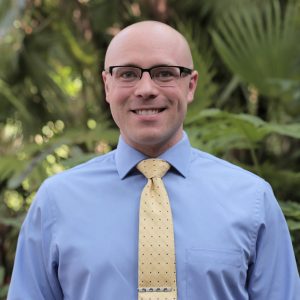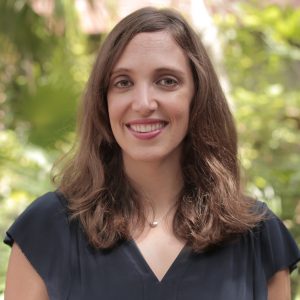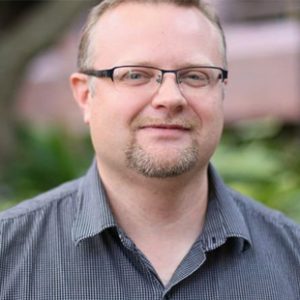The University of Florida College of Education has appointed three UF faculty to the prestigious B.O. Smith Professorship — Christopher Anthony, assistant professor in the School of Special Education, School Psychology & Early Childhood Studies, Hannah Bayne, assistant professor in the School of Human Development and Organizational Studies in Education, and Pasha “Pavlo” Antonenko, associate professor in the School of Teaching and Learning and director of the Neuroscience Applications for Learning (NeurAL) Lab.
The two-year endowed professorship supports education faculty who are conducting cutting-edge research that addresses pedagogical challenges and who are preparing to seek promotion. Appointed faculty receive $10,000 annually to support research and travel expenses for a total award package of $20,000 each.
Representing each of the College’s three schools of study, Anthony, Bayne and Antonenko are examining a broad range of opportunities to advance education including developing a universal intervention program for academic enablers, providing social justice consultant training to counseling education and counseling psychology students, and designing gaze-driven technologies using machine learning to provide individualized multimedia learning support to students.
Learn more about each of their intended research endeavors below:
Anthony’s scholarship centers around social-emotional learning and the academic enablers that promote student’s comprehensive success in school and beyond.
Academic enablers encompass the attitudes, skills and behaviors students possess that can promote their academic success in addition to their cognitive abilities (e.g., students’ motivation, engagement, and study skills). Although these factors are proven to foster students’ academic development, there are very few intervention programs available and even fewer that are aligned with today’s multi-tiered systems of support, which offer assessments and interventions based on levels of support.
To address the need for a comprehensive assessment of academic enablers, Anthony and a team of researchers have received a $1.39 million Institute of Education Sciences grant to update the Academic Competence Evaluation Scales (ACES) — the most prominent measure of academic enablers, but Anthony hopes to expand this research to address intervention as well.
“Most of my research to this point has been focused, at least in the applied sense, on assessment,” he said. “… But I also am interested in the other side of the coin, which is intervention and trying to promote and foster academic enablers.”
Under the B.O. Smith Professorship, Anthony will begin the initial phases of this work by first evaluating and adapting the Academic Intervention Monitoring System (AIMS), a guidebook and set of resources that provides interventional materials for teachers and school psychologists using ACES.
Alongside the original team of researchers who created AIMS, Anthony will gather feedback from P.K. Yonge Developmental Research School teachers on their implementation of AIMS informed interventions and revise these materials based on their findings to provide the foundation needed to develop a universal intervention program for academic enablers.
“My hope is to develop those insights into a manualized intervention package to help promote academic enablers in kids,” he said. “Hopefully something that can be delivered ideally at a class level because we’ve got a lot of class-level manualized interventions for other types of skills and behaviors, but academic enablers — despite their critical importance for academic achievement — don’t have a ton of specific intervention resources.”
As Anthony’s research has typically focused on measurement and assessment, he shared the B.O. Smith Professorship is a humbling opportunity that is supporting his expansion into the intersection of assessment and intervention.
“One thing that I would like to promote is the comprehensive integration of assessment and intervention,” he said. “Our field has gone through waves focusing on assessment and waves of focusing on intervention, and I think the reality is that both assessment and intervention are critically important for students and ought to be developed in an integrated fashion.”
Anthony hopes the B.O. Smith Professorship serves as the foundation for his continued scholarship in these spaces and to better connect assessments to interventions.
Bayne’s research agenda is broadly focused on the factors that cultivate connection or lead to disconnection. Under the B.O. Smith Professorship, she intends to expand on a recently piloted study that provides social justice training and supervision to Counseling Psychology and Counselor Education graduate students at UF.
Bayne worked with Della Mosley, assistant professor of counseling psychology, to design an interdisciplinary program that could address the gap in training that students were feeling with regard to applied practice in social justice work.
“Especially as social justice becomes this really critical additional force within counseling, students are coming hungry for knowledge about how to grow in their own skill set for social justice, and our programs don’t really have the space within the curriculum to fully explore what that looks like,” Bayne said.
Through a UF Creative Campus Grant, Mosley and Bayne established and piloted the Social Justice Consultation Corps (SJCC), recruiting, training and supervising eight graduate students to provide mental health consultation to UF student organizations that are supporting marginalized students and engaging in critical social justice work. The project has just finished the initial year, and the B.O. Smith Professorship allows the SJCC to continue developing and supporting student growth.
“And so, one goal I think is to offer that kind of opportunity for students who are really interested in not just a theoretical understanding of what social justice looks like, but the opportunity to apply the principles in their work,” she continued.
Through the SJCC initiative, consultants are trained to partner with student leaders to offer event assistance, provide training on handling microaggressions and difficult dialogues, and share research on additional resources to help these organizations expand their campus reach.
“It provides an opportunity and space for collaboration and for counseling students to help dialogue with, walk alongside, and work to support some of these amazing student leaders at UF who are working within spaces that are already committed to social justice,” she said.
Part of Bayne’s focus for the B.O. Smith Professorship is to reconceptualize the SJCC as a collaborative research endeavor between student consultants and student organizations. As such, students are co-researchers in a participatory action project that allows for co-ownership, research as action, and flexibility to adjust based on data gathered throughout the process. The SJCC will thus continually analyze the diverse needs of students to identify what supports are needed.
“There are all of these things that that can break down relationships and that can really harm and are harming our student populations, and this initiative is about helping student voices to be heard, helping them to feel, I think, empowered and affirmed in their experience, and to be able to try to re-story what their college experience could look like,” she said.
By partnering with student organizations that serve UF’s marginalized student populations and work in the realm of social justice and advocacy, SJCC hopes to foster opportunities for discussion, support, and to build a more connected campus by tackling challenging subjects and brainstorming solutions collectively.
“If we are engaging in collaborative spaces, if we’re using the strengths of both groups … then that’s going to have a ripple effect on the campus community,” she said “…to help create the space for students to feel supported, for students to feel a sense of belonging, particularly marginalized students who don’t always have that sense or feeling, and to highlight issues of inequity that can then be openly addressed.”
Although the B.O. Smith Professorship recognizes individuals, Bayne shared the SJCC would not exist without the ideas and leadership of Mosley or the dedication of the graduate students who are serving as campus consultants.
“The award was something that only a single person applies for and receives, and it feels like it’s not fully reflective of what this initiative is,” she said. “Della Mosley had an awesome vision of what this could be, and I’m grateful that I had the opportunity to work alongside her this year. It means a lot that I have her blessing to continue the project, even as she is unable to serve in the same role moving forward. And the SJCC certainly does not feel like my project alone. It’s co-owned by the students who are courageously working towards their passion of social justice and more equitable spaces.”
Bayne shared she is thrilled to continue expanding and refining the SJCC to support not only UF students, but also potentially the greater fields of practice. Having the support of her colleagues in receiving the high honor makes it all the more worthwhile.
“It helps me believe in myself,” she said, “believe that this is worthwhile and even when my own imposter syndrome might settle in, it presents some evidence that others are kind of in my corner cheering me on.”
Antonenko’s research focuses on enhancing technology supported learning environments through the development of personalized technologies that account for students’ individual learning differences. Through the B.O. Smith Professorship, he intends to design a novel gaze-driven display technology that can augment multimedia display in real-time based on learners’ gaze behavior and in response to differences in students’ working memory capacity.
Multimedia learning is the integration of written and spoken text, images, video and data visualizations to represent concepts. One’s working memory capacity offers the attentional control needed to support the selection, organization and integration of information that is gained from these multimedia materials.
Typically, quantitative educational research studies explore technological innovations in large samples with the results speaking to the collective group rather than individual learners and their specific needs.
“Educational researchers have been having discussions about adaptive and personalized learning for a long time, right, we do have some adaptive learning games and some adaptive learning environments like learning management systems,” he said.
“… But the problem is they all adapt typically to one thing — they typically only adapt to the students’ current knowledge of the content, the current learning performance,” he continued. “… What I’m saying is we need to start looking at underlying causes of that performance.”
Antonenko shared this often leads to innovations that best support some but may not offer the best support for all. As learners have unique strengths and weaknesses, it is important to design and evaluate personalized learning technologies that take into account attentional and cognitive differences, like working memory capacity.
His project will include two studies — study one will investigate eye tracking patterns to examine the role of working memory capacity in learners’ use of media integration strategies, and study two will leverage those findings to develop a gaze-driven adaptive multimedia learning system powered by artificial intelligence that can provide real-time learning support.
Each study will enlist 200 University of Florida and Santa Fe College students to identify what constitutes effective media integration strategies for those with higher working memory capacity and those with lower working memory capacity to identify and address those gaps. The AI-powered learning system will enhance learning outcomes by adapting multimedia displays of information based on students’ gaze behaviors to guide them to key information as needed.
“I’m personally a big proponent of a focus on individual differences in learning and teaching,” he said. “… So, what are we doing to design environments that will work for everybody, not just for some?”
Antonenko shared receiving the B.O. Smith Professorship to support this work is a great honor and one that not only advances his scholarship, but also positions the College of Education as a leader in education AI.









